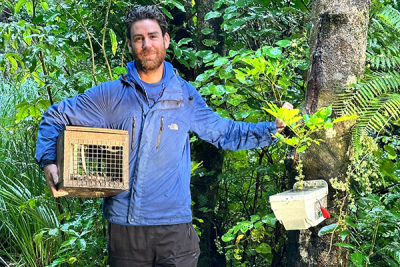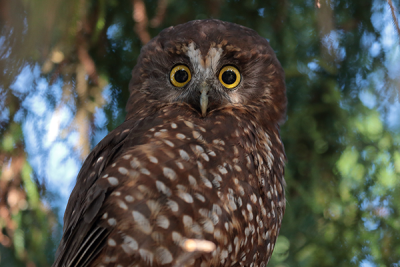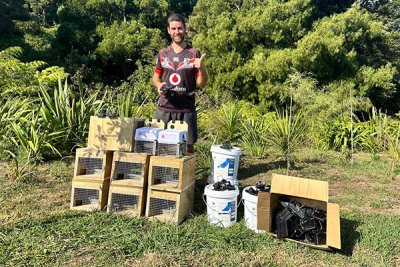
Greg Townsend spends two hours a day trapping on his 40-hectare property.
When Greg Townsend first started trapping predators on his property and the adjoining Hakarimata Scenic Reserve in Ngāruawāhia three years ago, he was catching 50 possums a week with no end in sight.
“After that first year, and not seeing any difference to the bush, it was pretty hard to stay motivated,” says Greg, who at the time was just one of four adjoining landowners on a mission to turn around the canopy collapse and restore birdsong to the Hakarimata Range.
But the small group persevered, with funding and support from various organisations (including Waikato Regional Council’s Small Scale Community Initiatives Fund, Go Eco, the Department of Conservation, Waikato District Council, Transpower, Forest & Bird and Pukemokemoke Trust), and they’ve now got 100 locals on board to endeavour to help make the Hakarimata Range become predator free.

“It’s nice to go to bed at night and listen to ruru calls rather than possum screams.”
Predator Free Hakarimata, which launched its Hakarimata Halo Project to the community in May, has now removed more than 5000 pest animals from the mountain – mostly possums.
“I’d never trapped a possum in my life, so to reach these numbers was quite mind boggling,” says Greg.
Greg’s property is 40 hectares of mostly forested land, and he’s planted at least 2000 native trees on the two hectares that isn’t.
He bought the forest block three years ago, inspired by his volunteer work for the Pirongia Te Aroaro o Kahu Restoration Society, and immediately connected with three neighbours who were already planting and trapping in the area under the name of Morepork Action Group.

Greg started trapping with three neighbours who operated under the name of Morepork Action Group.
“In our first two years, we didn’t see much increase in native birds, but our trees did start to bounce back. Now, we are seeing more native birds, more wētā in the bush, and it feels like all the hard slog was worth it. It’s nice to go to bed at night and listen to ruru calls rather than possum screams.
“Last nesting season, we had six ruru fledge from three nests we were monitoring, and we now have bellbird year-round.
“But when you walk up our traplines and onto the DOC reserve it goes instantly silent. I spend two hours a day trapping, doing a different ridge every day, but we're up against it with constant reinvasion from up in the mountain.”
According the the Department of Conservation website, the Hakarimata Range is home to 122 different species of native land snail, the ancient peripatus (velvet worm), many other invertebrate species, a population of long-tailed bats, native skinks, geckos and native fish.
“All these species deserve a safe habitat and are worth any trapping efforts. We know we could grow something very special, but we need feet on the ground.”
Greg says more than 200 locals turned up to the launch of the Halo project, buying traps and wanting to learn how they could help.
“There are so many landowners doing amazing things, we just need to connect everyone.
“The idea is we want to grow the current project area from 200 hectares to 1000 hectares to create a halo around the bottom of the maunga, in everybody's backyards.
“We now have 100 volunteers on the books, ready to help once we have a trapping network set up into the DOC reserve, so there's definitely a big community push for change out there. “Hopefully, once the halo is up and running and we have a successful buffer operating around the mountain, that'll give impetus for an aerial operation on the mountain.
“And then, who knows, maybe we can even return what’s been lost to Hakarimata, like kōkako and kiwi.”

